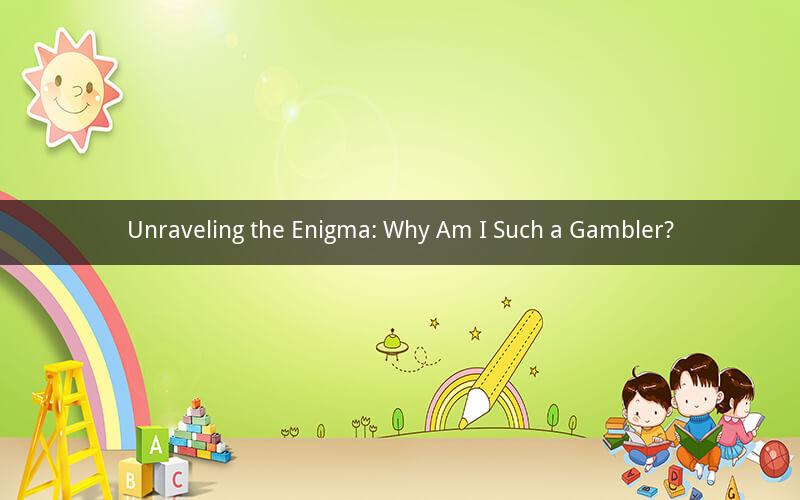
Introduction:
Gambler, a term that evokes images of thrill and danger, often leaves individuals pondering over their addictive behavior. The question "Why am I such a gambler?" plagues many who find themselves entangled in the allure of gambling. This article delves into the psychological, environmental, and biological factors that contribute to gambling addiction, providing insights into why some individuals are more susceptible to this dangerous habit.
1. Psychological Factors:
a. Dopamine and Reward System:
The brain's reward system plays a crucial role in gambling addiction. Dopamine, a neurotransmitter associated with pleasure and reward, is released when a gambler wins. This release creates a feeling of euphoria, reinforcing the desire to gamble again. Over time, the brain becomes accustomed to this reward, leading to a higher tolerance for the risk involved in gambling.
b. Thrill-Seeking Behavior:
Some individuals have a natural inclination towards thrill-seeking activities. The adrenaline rush and excitement derived from gambling can be irresistible for those who thrive on such experiences. The thrill of the unknown and the potential for winning big can override rational thinking, leading to compulsive gambling behavior.
c. Emotional Regulation:
Gambling can serve as a coping mechanism for individuals dealing with emotional distress. Stress, anxiety, depression, and other negative emotions can drive individuals to seek relief through gambling. The temporary escape from reality and the sense of control it provides can make gambling an appealing solution to emotional turmoil.
2. Environmental Factors:
a. Availability of Gambling Opportunities:
The accessibility of gambling venues and online platforms has significantly increased in recent years. The widespread availability of casinos, sportsbooks, and online gambling websites makes it easier for individuals to engage in gambling activities. This easy access can contribute to the development of gambling addiction.
b. Social Influence:
Peer pressure and social influence can play a significant role in the development of gambling addiction. Individuals may be influenced by friends or family members who engage in gambling, leading them to try it themselves. The desire to fit in or impress others can override personal values and lead to compulsive gambling behavior.
c. Media and Advertising:
The portrayal of gambling in movies, television shows, and advertisements can create a glamorous image of gambling. This portrayal can make gambling seem exciting and desirable, especially to impressionable individuals. The constant exposure to gambling-related content can reinforce the desire to engage in gambling activities.
3. Biological Factors:
a. Genetic Predisposition:
Research suggests that genetics play a role in the development of gambling addiction. Individuals with a family history of addiction may be more susceptible to developing gambling problems. Certain genetic factors can affect brain chemistry and make individuals more prone to addictive behaviors.
b. Brain Chemistry:
The brain's chemistry can influence an individual's susceptibility to gambling addiction. Imbalances in neurotransmitters, such as serotonin and dopamine, can contribute to addictive behaviors. Additionally, certain brain structures, such as the prefrontal cortex, play a crucial role in decision-making and impulse control, which can be impaired in individuals with gambling addiction.
4. Coping Mechanisms:
a. Escape from Reality:
Gambling can provide a temporary escape from the stresses and challenges of everyday life. The immersive nature of gambling can distract individuals from their problems, offering a sense of relief and escapism.
b. Financial Gain:
The allure of winning big can drive individuals to engage in gambling. The prospect of financial gain can override rational thinking and lead to compulsive gambling behavior.
5. Treatment and Support:
a. Therapeutic Approaches:
Several therapeutic approaches are available to help individuals overcome gambling addiction. Cognitive-behavioral therapy (CBT) focuses on identifying and changing negative thought patterns and behaviors associated with gambling. Other approaches, such as motivational interviewing and contingency management, can also be effective in treating gambling addiction.
b. Support Groups:
Support groups, such as Gamblers Anonymous, provide individuals with a platform to share their experiences and receive support from others who have faced similar challenges. These groups can offer valuable insights and coping strategies for overcoming gambling addiction.
Conclusion:
The question "Why am I such a gambler?" is a complex one, with various factors contributing to the development of gambling addiction. Understanding the psychological, environmental, and biological factors at play can help individuals seek appropriate treatment and support. By addressing these underlying factors, individuals can overcome their gambling addiction and lead healthier, more fulfilling lives.
Additional Questions and Answers:
1. Q: Can gambling addiction be cured?
A: While there is no guaranteed cure for gambling addiction, it can be effectively managed and treated through various therapeutic approaches and support systems.
2. Q: Is gambling addiction a disease?
A: Yes, gambling addiction is recognized as a mental health disorder by the American Psychiatric Association. It is characterized by compulsive gambling behavior that can lead to significant harm.
3. Q: Can someone be a social gambler and not develop an addiction?
A: Yes, it is possible for individuals to engage in social gambling without developing an addiction. However, it is important to be aware of the signs of problem gambling and seek help if necessary.
4. Q: How can I help a loved one struggling with gambling addiction?
A: Encourage your loved one to seek professional help, offer support, and be patient throughout their recovery journey. Educating yourself about gambling addiction can also help you better understand and support your loved one.
5. Q: Can online gambling be more addictive than traditional gambling?
A: Yes, online gambling can be more addictive due to its convenience and accessibility. The ability to gamble from the comfort of one's own home and the constant availability of online platforms can make it easier for individuals to engage in compulsive gambling behavior.